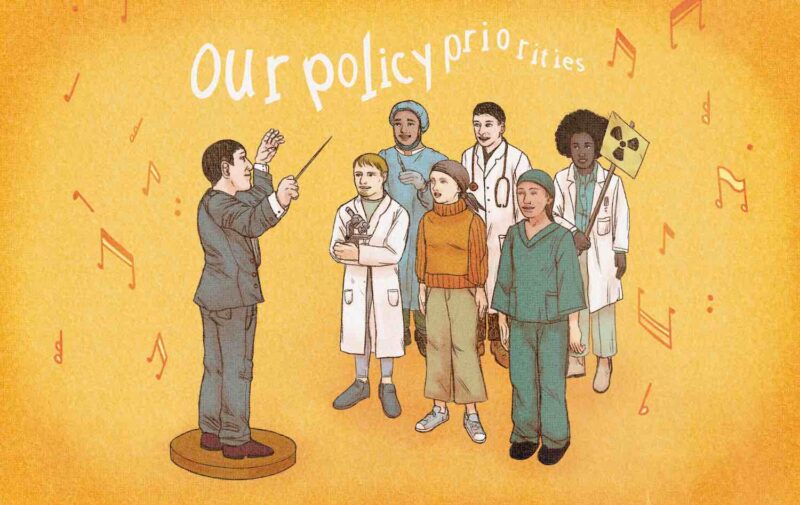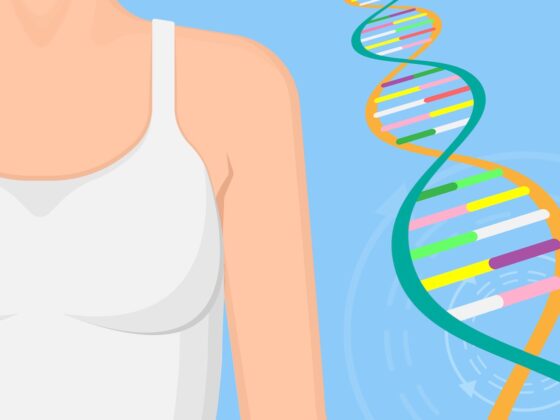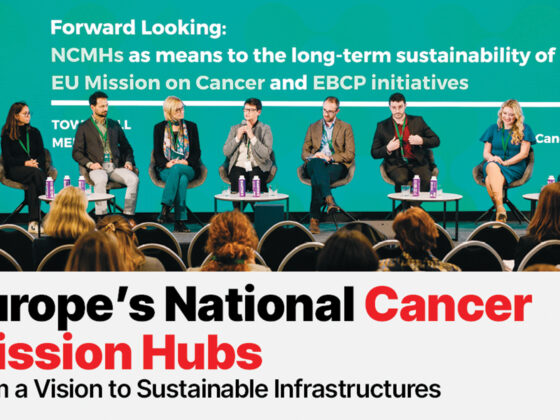A window of opportunity is opening up across Europe to reverse the ever-rising trend of new cancers and improve outcomes for patients everywhere.
It’s been brought about in part by a major shift in favour of Europe taking on a stronger policy making role in health and healthcare. The traditional argument that healthcare policy must be a purely national competence has lost ground in the face of insistent demands, not least from cancer patient advocates, to end gross disparities in health outcomes, together with evidence of the advantages of collaborating to improve access to quality care. The Covid-19 pandemic has also played a part in transforming attitudes: viruses don’t respect borders, and the argument that Europe’s economic success can be separated from the health of its citizens is no longer credible.
EU President Ursula von der Leyen, who took office after the 2019 European elections, is a champion of expanding the EU’s health remit. Under her leadership, and with strong backing from across the European Parliament, the EU4Health programme has hugely expanded its budget, to more than €5 billion over seven years. Expanding areas of action include strengthening health systems, digital transformation of health systems, access to healthcare, and making medicines and medical devices available and affordable. Cancer is a priority.
First we have the Cancer Mission, one of only five mission areas funded within the Horizon Europe research framework, and the only one focused directly on health. With budgets yet to be finalised, this is the first time the EU has framed research funding in terms of defined goals relating to social impacts – lives saved, lives improved, cancers prevented, inequalities reduced.
Then most recently, on 3 February 2021, came the launch of Europe’s Beating Cancer Plan. Led by EU Health Commissioner Stella Kyriakides, it sets out a wide range of “ambitious but achievable goals” with specific targets and timelines and backed by €4 billion of funding. These include actions in traditional EU policy areas such as public and environmental health and research, but there is also a focus on actions to level up access to high quality diagnostics, screening and care that show the new assertiveness in getting involved in issues of healthcare structures and delivery.
On top of the longstanding EU role of developing quality guidelines for screening programmes comes a new emphasis on implementation, with a target of 90% uptake of screening for breast, cervical and colorectal cancer. The goal of equal access to high quality diagnostics and care is supported by actions to concentrate cancer care within comprehensive cancer networks, which balance the need to pool specialist knowledge and experience with the need to extend access to that specialist care to people, regardless of their socio-economic means, and in whatever corner of the country or the region they may live.
While this is all music to the ears of Europe’s cancer community ‒ and indeed the result of many years lobbying to push cancer up the political agenda ‒ it has also put on their shoulders a big responsibility. Europe’s politicians have lined up behind policies that are worth fighting for ‒ can the cancer community work together to deliver the pressure that will be required to ensure those policies lead to action?
So many different voices
One of the big challenges to working together is the extraordinary diversity of roles that play their part in beating cancer – from the public health, environmental health, and lifestyle prevention roles to the GPs, imagers, pathologists and molecular biologists involved in early diagnosis and diagnostics, to all the disciplines and specialists involved in planning and delivering treatment and care and support for survivors, and of course the patient advocates who have expert knowledge about what matters along the entire patient pathway. Each of these contributing roles will have their own priorities regarding what has to happen to improve the service they are able to provide.
Speaking at the February press launch, of the Beating Cancer Plan, Stella Kyriakides ‒ herself a cancer survivor and former president of the European Breast Cancer Coalition Europa Donna ‒ said she and her team had spent the past year “listening, consulting… and learning”, and that they had received more than 2,500 contributions that helped shape the plan. She signalled that she wants to maintain this high level of interaction with interested parties as the focus moves on to getting the plan implemented across Europe: “I will be asking them… to join me on this journey, to walk this path, and to help turn this concrete ambition into concrete action.”
“I will be asking them… to join me on this journey, to walk this path, and to help turn this concrete ambition into concrete action”
The European Parliament, meanwhile, has set up its own Beating Cancer Plan (BECA) committee. Chaired by Bartosz Arlukowicz, a Polish MEP and paediatrician, the committee has been holding its own public panel hearings on topics including: Empowering patients and their caregivers ‒ patients’ rights, survivorship, quality of life ‒ as well as Equal access to cancer medicines and treatments.
Like Kyriakides, Arlukowicz also stresses the need for those involved in the fight against cancer to actively engage with the EU policy process. His message to those attending the 2020 European Cancer Summit was unequivocal: “I would like to ask you all to treat the BECA special committee as a means of achieving our common goals. To use the opportunity to create, to put forward concrete proposals, for improving our systems of oncological care. BECA is a scene for politicians, but mostly it should be a scene for us. Doctors and patients.”
It’s a welcome invitation, but some doctors and patients may find it easier than others to respond.
Getting heard
A leading figure in the European Oncology Nursing Society, Andreas Charalambous has represented EONS in discussions with many policy makers on a range of issues, and has encountered many challenges. “It is not an easy task to transfer the message from the disciplines and the professions directly to the European Parliament, or any policy maker. The difficulty may lie in the fact that we don’t speak the same language in the sense that we tend to be more technical when we speak to issues involved in cancer. Our issue is that it is not always receptive on the policy makers’ side on the same issues that are of concern to us.”
But the consultations over the Beating Cancer Plan were different, he says. “The consultation was open and policy makers were seeking extensive and detailed input… We analysed to [Health Commissioner Stella Kyriakides] the vision of the European Oncology Nursing Society as a whole, and also what the society is expecting from the EU Beating Cancer Plan, in order for the plan to be relevant and realistic in terms of the realities of the clinical context in relation to cancer nurses.”
The consultations around the Plan also helped open a direct pathway to areas of the Commission dealing with related policy areas, says Charalambous: “For example research and employment, where we directly got in touch with them to raise issues of concern to us.”
Europe’s cancer surgeons, by contrast, say they are struggling to get their voice heard because, while they have a lot to say about how to raise survival rates and quality of life for patients across Europe, they currently lack the public relations capacity to make that case at the right time and in the right places.
Isabel Rubio is President Elect of the European Society of Surgical Oncology, and heads up the breast surgical oncology unit at the Navarra University hospital in Madrid. The majority of cancer patients will need surgery at some point in their treatment, and for most of them it offers the best hope of a cure, she says, “but when you talk about innovation in cancer or treatment, most of stakeholders, policy makers, think about medication,” she says. “They forget about the other parts of the treatment.”
“Imagine in surgery how things have changed in the last 10 years. We are continuously trying to preserve the organ. We are now doing surgery for hereditary syndromes to reduce the risk of getting cancer. We are doing surgery in early stage cancer, in locally advanced cancer, and in some metastatic cancers where surgery often benefits. We think that those specialists doing cancer surgery don’t need to be trained in surgical oncology?”
Europe’s cancer surgeons have a simple and clear message she says: “To improve outcomes, cancer patients should be operated in cancer units by surgeons who have been trained as surgical oncologists, as they have the requisite knowledge about cancer and cancer surgery.” Patient advocates strongly support such a measure, she says, but she worries that the surgical oncology community is finding it hard to compete with other disciplines and specialisms to get that message across.
“There have been so many groups trying to get their voice heard in the European Commission. So unless you have an expert in public affairs…”
“With the Europe’s Beating Cancer plan, there have been so many consultations, there have been so many societies, institutions, groups trying to get their voice heard in the European Commission. So unless you have someone who is an expert in public affairs… you are doing surgery, you are seeing patients you are doing clinics – you need someone who is on the policy level. That can send the message that we want to get through.”
ESSO is now working with a consultancy to upgrade the society’s public affairs capacity. “Unless we have professional skills we are not going to get anything changed. We can be advocates, but our time is limited, our knowledge is limited, and if you want policy changes by lawmakers done in Europe, by the European Commission, you need to be there, you need to know how everything moves around, and for us as surgeons this is way out of our area of action.”
Joining forces
Rubio argues that every profession that plays a role in cancer care has something to say about how to improve the unique services they provide and needs their own voice to be heard. She recognises, however, that the value of super-specialisation applies across the field of cancer care, and that there are advantages in collaborating to get that message heard. “At the end, many of our problems, or many of our solutions, are mainly the same. We just need special training and we need our specialty, or sub-specialty, officially recognised by member states. This is also the case for other professions involved in the multidisciplinary care, such as oncology nurses and so on. Because cancer management has become so complex.”
ESSO is now collaborating with other professional oncology societies in a network set up by the European Cancer Organisation dedicated to policy issues around the cancer workforce.
The network ‒ one of nine such ‘focused topic networks ‒ is chaired by representatives from European societies of cancer nursing, surgical oncology and oncology pharmacy, with radiotherapists, radiologists, molecular imaging specialists, geriatric oncologists, psycho-oncologists, urologists, breast cancer specialists among the participating groups.
Developing recognised education and qualification is an issue common to many of these groups, not least the cancer nurses, who have been campaigning on this issue for decades. “The argument is much the same everywhere,” says Charalambous, who was recently elected as President Elect of the European Cancer Organisation. “How is it possible for somebody who has absolutely no specialisation to treat a cancer patient?”
“The argument is much the same everywhere… How is it possible for somebody who has absolutely no specialisation to treat a cancer patient?”
Coordinating work in this area is quite a challenge, he says, because of the wide diversity in the type of work done by the participating societies, but he agrees that teaming up on this topic with the cancer surgeons and professional groups makes good sense. The bare bones of a policy position developed by the network ‒ on access to multiprofessional care and the need to proactively deploy the Professional Qualifications Directive “to support specialisms in cancer care in harmonising education and training requirements” ‒ was one of a number of policy resolutions presented to the European Cancer Summit, last November, and endorsed by a vote of all participants. The intention is to use this evidence of broad backing from across the cancer community as ammunition in discussions with policy makers at EU and national levels.
European Cancer Organisation focused topic networks
Nine networks bring together different coalitions of interest groups around specific topics develop collective policy positions, which are published on their respective webpages. Health Systems and Treatment Optimisation ‒ 27 participating organisations, with EORTC (clinical researchers) and ESTRO (radiation oncologists) in the chair Quality Cancer Care‒ 28 organisations, with ESTRO and the Organisation of European Cancer Institutes in the chair Inequalities‒ 23 organisations, with the European Association of Urology and SIOG, the geriatric oncologists, in the chair Survivorship and Quality of Life ‒ 22 organisations with MASCC, the supportive care in cancer specialists, and IPOS, the psycho-oncologists, in the chair Workforce ‒ 14 organisations, with EONS, the cancer nurses, ESOP the oncology pharmacists, and ESSO, the cancer surgeons, in the chair Digital Health ‒ 20 organisations, with the European Association of Nuclear Medicine and the European Society of Radiology in the chair Prevention ‒ 16 organisations, with the European Society of Breast Cancer Specialists and European Respiratory Society in the chair HPV Action ‒ 22 organisations, with the Association of European Cancer Leagues and EONS in the chair Impact of Covid-19 on cancer ‒ 26 organisations, with European Cancer Organisation board members in the chair
A magnifying voice
“We do our best to be a magnifying voice,” says Matti Aapro, President of the European Cancer Organisation. “We are not seeking to speak on specific areas where our members have the expertise, but to pull it all together.” Organising coalitions of interest to work on developing policy within the focused topic networks, he says, is a completely new way of working. “It’s not meeting every now and then to say ‘hello’ for one hour. It is hours and hours of collaborative work.”
The first networks were launched in October 2019, as part of a transition away from the federal model used by the European Cancer Organisation in its previous incarnations as the Federation of European Cancer Societies, and later ECCO. The topics focus on different parts of the patient pathway, from prevention through to survivorship. Policy development for each topic is done with explicit reference to the list of 10 ‘patients’ rights’ defined in the European Code of Cancer Practice ‒ a ‘citizen and patient-centred manifesto’ of the core requirements for good clinical cancer practice.
The initial plan was to develop the networks one at a time, says Aapro, “But there was so much enthusiasm right from the beginning from all the members, we were able to get all the networks started by the following Spring… Member organisations suddenly realised that if you have a specific area of interest in that specific area of interest you have also many other organisations that also have an interest.”
The model seems to be working, judging by the number of organisations who are now contributing to the various networks. The European Hematology Association is the most recent new member, joining forces with other cancer organisations in developing an urgent response to the challenge of the Covid-19 pandemic. The flexible format also makes it easier for groups that are not primarily cancer societies to get involved, such as professional societies for sexual medicine, and study and management of pain, and of obesity.
Patient advocacy groups covering a full range of cancers played a central role in developing the European Code of Cancer Practice, and now spread their efforts across all the networks ‒ with a particular interest in topics of quality care, quality of life and treatment optimisation. Stefan Gijssels, a patient advocate with Digestive Cancers Europe, who co-chaired the European Cancer Organisation’s Patient Advisory Committee for the past two years, echoes what Aapro says about the value of collaboration in lobbying policy makers to take a broad range of actions to improve cancer outcomes. “The advantage, for all the identified topics, is to find common ground among all these associations, bringing different perspectives, different evidence and facts and stories, and to come to a common resolution. By doing that we create an authority at the policy level that very few organisations might have.”
“The advantage is to find common ground and come to a common resolution. By doing that we create an authority at the policy level”
It is easier for institutions working on cancer policy to have a counterpart, he says. “Otherwise they have to have a dialogue with the individual members and of course they all have their vested interests and you have divergence and it makes it politically much more difficult to find the right way forward, because then they have to give preference to one over the other. It is much better that we create consensus among ourselves.”
It’s a strategy that Aapro believes paid off when it came to the consultations around the Cancer Mission and the Beating Cancer Plan ‒ indeed some European Commission DGs explicitly asked them for “clear messages on what are the priorities,” he says.
Seize the moment
With the Cancer Mission and the Beating Cancer Plan now launched, Europe’s cancer community now faces the much bigger challenge of turning paper policies into reality in every country, every region, every health service.
Nine in every ten eligible cancer patients being cared for within the proposed networks of National Comprehensive Cancer Centres; nine in ten of those eligible for cancer screening receiving invitations to participate in programmes that comply with EU quality guidelines; improved care for survivors and an end to unfair discrimination ‒ these and other goals on prevention, early detection and more are hugely ambitious, but all the more worth fighting for.
The cancer community has shown it can collaborate to magnify its voice at a European level. Applying a similar strategy at a national level may now be crucial to convincing governments in each and every member state to do what it takes to deliver on the ambitious goals of Europe’s Beating Cancer Plan.
Illustration by: Sara Corsi












